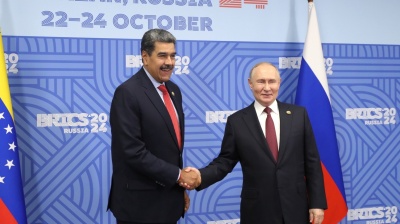Tensions in the Caribbean deepened last week after US President Donald Trump escalated his confrontation with Venezuela, accusing President Nicolás Maduro of collusion with Latin American cartels designated as terrorist groups.
The move, tied to claims of drug trafficking into the US, has triggered the largest American naval presence in the region in decades.
By late August, Washington had dispatched more than 4,000 troops, eight missile-equipped ships, a nuclear-powered submarine, and 10 F-35 jets to Puerto Rico, Ambito reported. On September 2, the fleet opened fire on a Venezuelan vessel, killing all 11 on board, in what the Pentagon described as an anti-drug operation.
Caracas dismissed the strike as a pretext for aggression.
Maduro, appearing on September 5 in full military attire at Fort Tiuna in Caracas, vowed resistance and announced the activation of over 5,300 militia units, which the government claims encompass more than 12.5mn fighters.
“Venezuela is today a territory free of coca leaf production, free of drug processing in the country, and very soon we will be 100% free of any attempt to smuggle even a grain of this drug into our national territory,” Maduro said in a speech.
Washington accuses the Venezuelan leader of heading the "Cartel de los Soles", an alleged criminal and terrorist organisation involved in cocaine trafficking to the US.
But scholars question whether this group exists as a formal entity, though they acknowledge that Venezuelan government officials may be involved in drug trafficking activities.
“Cartel de los Soles, per se, doesn’t exist. It’s a journalistic expression created to refer to the involvement of Venezuelan authorities in drug trafficking,” Phil Gunson, a researcher with the Caracas-based International Crisis Group, told CNN.
While brushing off US charges and the $50mn bounty placed on his head, Maduro nonetheless appealed for dialogue with Trump, saying Venezuela was ready to talk “with respect.”
Trump, however, doubled down, warning Venezuelan aircraft would be shot down if they endangered US Navy ships engaged in patrols. His threat followed two overflights of US vessels by Venezuelan jets in recent days.
Analysts told the BBC that the massive show of force recalls Cold War-era interventions. "We haven’t seen this scale of naval concentration since 1965," noted historian McPherson, suggesting the operation may go beyond counter-narcotics to efforts at destabilising the Bolivarian regime.
US Secretary of Defence, recently renamed "Secretary of War," Pete Hegseth reinforced the combat posture on September 8, telling Marines aboard the USS Iwo Jima that “this is a real-world exercise”, according to a social media post.
Caracas has rejected the US narrative outright. Vice President Delcy Rodríguez responded by branding the trafficking allegations a “complete farce,” citing UN findings that Venezuela plays a limited role in the global drug trade, DW reported.
She called the deployment a deliberate "attempt to criminalise the government and justify military intimidation."
The Venezuelan government has described the recent US naval build-up off the country's coast as the most serious threat the region has faced in a century, fearing Trump may be using military force to dislodge Maduro from power.
News

Russia floats missile supplies to Maduro as US pressure mounts
A prominent Russian lawmaker has suggested that Moscow could supply Venezuela with advanced weapons systems, including the new Oreshnik ballistic missile, as Caracas desperately seeks military assistance amid the escalating US military build-up.

Guinea’s Doumbouya enters presidential race with major opposition parties excluded
Guinea’s junta leader Mamadi Doumbouya has entered the December 28 presidential race under a new constitution that allows members of the transition government to stand and extends presidential terms.

Russia closing the trap as its forces expand control of Pokrovsk
The stronghold city of Pokrovsk in the heart of the Donbas now risks “becoming a graveyard for Ukraine’s finest,” Euromaidan Press reports as Russian forces expand their control and threaten to encircle hundreds of Ukraine’s best troops.

Czech election winner Babiš signs coalition agreement with SPD and Motorists
ANO and its partners are poised to form the most rightwing cabinet in the country’s history.

.jpeg)
_1762193126.jpg)
